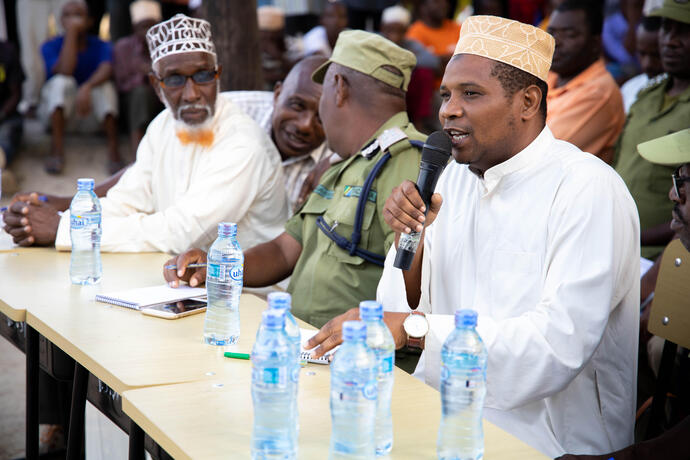News
Faith leaders fight child marriage in Zanzibar
- 13 October 2021
News
STONE TOWN, Zanzibar, Tanzania – Sheikh Is-haka Vuai leads a group of imams in openly opposing child marriage in his community. It is not an easy role, he says.
“About six of my madrassa students between the ages of 15 to 17 dropped out of school over a period of less than five months,” he recalled recently, referring to students at Islamic religious schools. “They not only lost the opportunity to get a religious education, but also lost the opportunity to build their future through school education, which was cut short because of the marriage.”
Sheikh Vuai is a respected community leader, serving as both secretary of the Zanzibar Imams Association and secretary of the North A District Faith Leaders Gender-Based Violence Action Group, which has been championing efforts to end violence and harmful practices against women and girls. Their work, across the two islands of Zanzibar, has been ongoing for the last two years.
Still, child marriage and other harms are persistent: One of his students recently returned home less than four months after being married, he recounted. The girl was pregnant, alone and had no way of supporting herself or her child.
Changing minds and attitudes
Child marriage is a pervasive issue in Zanzibar, where 18 per cent of girls are married before age 18. Some 3.5 percent of these girls are married before the age of 15. These early marriages are often driven by negative gender norms, and many faith leaders are expected to support the practice, Sheikh Vuai said.
That is why his work, and that of his fellow faith leaders, has been so critical. Together they have been conducting extensive outreach in their communities. Since July 2021, the North A District Action Group has engaged with over 2,700 people at madrassas, schools, community gatherings and mosques. Their message is clear: Early marriage has adverse psychological and health impacts on girls, has negative impacts on the economy and sustainable development, and is not acceptable under any circumstances.
“Our main focus is on the health risks, which include maternal and child mortality, and the negative impacts on girls who cannot realize their dreams. If the marriage fails, without an education a girl really has no future,” said Sheikh Vuai.

A better and more equal future
UNFPA and partners have been partnering with faith leaders in Zanzibar for several years. There are now 11 Faith Leader Gender-Based Violence Action Groups in Zanzibar, one in every district, tackling the discrimination and gender inequalities that continue to impact women and girls’ rights and choices.
Now, to bolster these efforts, a three-and-a-half-year programme has been launched by UNFPA with funding from the Embassy of Finland. Called “Chaguo Langu Haki Yangu”, meaning “My Choice My Rights”, the programme focuses on empowering young women and adolescent girls in Mara and Shinyanga Regions, of mainland Tanzania, and in Zanzibar.
These activities will include providing essential sexual and reproductive health information and human rights knowledge to adolescent girls, including through existing UNFPA-supported adolescent girls’ clubs. Chaguo Langu Haki Yangu will also support initiatives that offer alternative rites of passage in communities that practice female genital mutilation. And in Zanzibar, the project builds on the work of faith-leaders.
Many of the activities will be driven by young women and girls themselves, including persons with disabilities. And police and justice officials will benefit from strengthened policies, laws and guidance on how to sensitively and effectively meet the needs of survivors of violence and harmful practices.
“Every young woman and girl has within her possibilities that should flourish as she moves into adulthood, shaping her future and, with it, the world,” said Jacqueline Mahon, UNFPA’s representative in Tanzania. “Their rights must be at the centre of the better and more equal world we have collectively promised to deliver.”
The news was welcomed by faith leaders and other partners.
“We have seen some encouraging progress over the last few years,” said Sheikh Vuai, “And I have high hopes that if these efforts are sustained then violence and harmful practices against women and girls, including early marriage, will not only be significantly reduced, but eliminated altogether.”